Raw fermentation offers you far more than just food preservation – it's a powerful way to boost your health naturally. When you ferment raw vegetables, beneficial bacteria break down sugars and create essential compounds that your body craves. You'll get enhanced nutrient absorption, improved digestion, and a stronger gut microbiome. The process also creates natural probiotics that support your immune system and can even influence your mood through the gut-brain connection. By introducing these living foods into your diet, you'll tap into an ancient practice that modern science continues to validate with fascinating discoveries.
Unlocking Ancient Preservation Wisdom
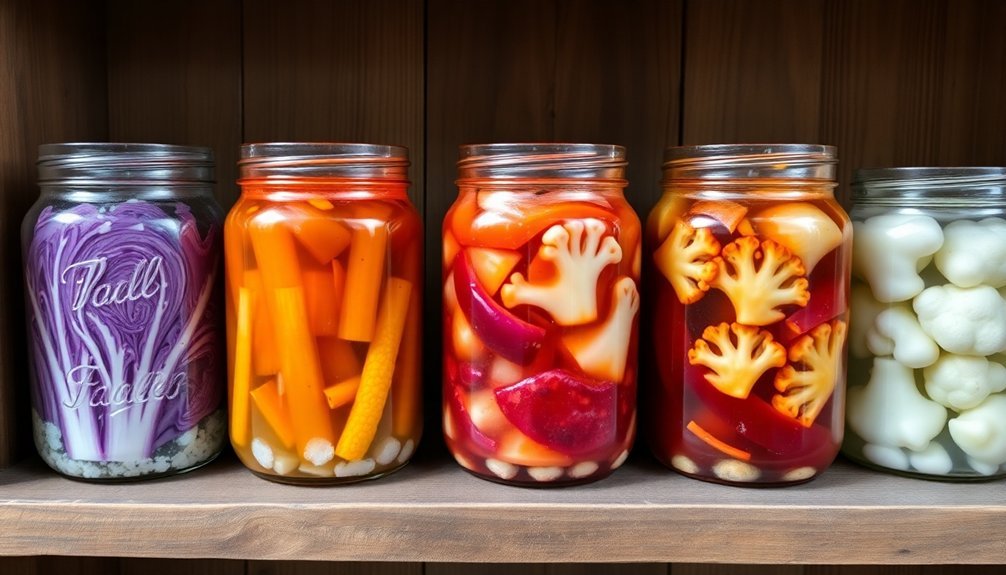
Through the mists of time, fermentation stands as one of humanity's most ingenious discoveries for food preservation. You'll find its roots deeply embedded in ancient civilizations, from Egyptian beer-making to Chinese fermented soybeans, showcasing humanity's remarkable ability to harness nature's preservation processes.
When you look at the ancient methods, you'll discover that cultures worldwide developed sophisticated fermentation techniques using bacteria and yeasts to break down food sugars. They didn't understand the microscopic details, but they recognized that this process created an environment where harmful bacteria couldn't thrive. The emergence of lactic acid bacteria during fermentation naturally preserved foods by creating an acidic environment.
You can see this wisdom in their choice of materials, like stoneware and glass containers, which didn't react with the fermenting foods.
What's fascinating is how these ancient societies developed their unique approaches based on local ingredients. Whether you're examining Asian soy sauce production, European cheese-making, or Middle Eastern dairy preservation, you'll notice how they all understood fermentation's dual benefits: longer-lasting food and enhanced nutrition.
While they couldn't explain the science, they'd discovered through careful observation that fermented foods offered both preservative and medicinal properties, a finding that modern science continues to validate.
Raw Fermentation Science Fundamentals
Raw fermentation harnesses the power of beneficial microbes to transform your food through their natural metabolic processes.
You'll find these microscopic workers produce essential enzymes that break down complex compounds into more digestible nutrients while creating protective acids.
Your success in raw fermentation depends on maintaining ideal temperatures, typically between 65-75°F (18-24°C), which keeps the microbial cultures active without promoting the growth of harmful bacteria. This ancient preservation technique, dating back to 10,000 BCE, continues to provide both nutritional and storage benefits.
Microbial Cultures At Work
Nature's microbial workforce performs an intricate dance during raw fermentation, transforming ordinary ingredients into nutritionally enhanced foods. You'll find beneficial bacteria, yeasts, and fungi working together, breaking down sugars and creating essential compounds that not only preserve your food but also boost its nutritional value.
These microscopic workers produce organic acids and ethanol, naturally protecting your food from spoilage while developing complex flavors. When you're fermenting raw foods, you can either rely on spontaneous fermentation using naturally present microorganisms or add specific starter cultures to control the process. Microorganisms have been enhancing our food for over 3.5 billion years, making them Earth's original food preservationists.
| Microbial Type | Primary Functions |
|---|---|
| Lactic Acid Bacteria | Vitamin synthesis, acid production |
| Yeasts | Ethanol production, CO2 release |
| Beneficial Molds | Enzyme production, flavor development |
| Mixed Cultures | Complex fermentation, enhanced preservation |
You're tapping into a process that involves more than 260 species of beneficial microorganisms. These tiny powerhouses don't just preserve your food; they're creating biologically active compounds that can lower blood pressure, reduce inflammation, and support your gut health. In industrial settings, these cultures are carefully selected and produced in controlled environments, ensuring consistent, safe fermentation results.
Natural Enzyme Production Process
The intricate enzyme production process during raw fermentation relies on millions of microorganisms working systematically to break down complex molecules. These microbes naturally produce various enzymes like proteases, hydrolases, and lipases that transform your food's complex components into simpler, more digestible forms.
During fermentation, you'll find that different microorganisms produce specific enzymes based on their environment and available nutrients. For example, lactic acid bacteria create enzymes that convert starches into lactic acid, while yeasts produce zymase for alcohol fermentation. The metabolic activities of these microorganisms are essential for successful fermentation outcomes.
The natural enzyme production process follows these key stages:
- Microorganisms assess environmental conditions (temperature, pH, nutrients)
- They regulate enzyme production based on available substrates
- Enzymes break down complex molecules into simpler compounds
- The process continues until ideal fermentation is achieved
You'll notice improved nutritional benefits as these enzymes enhance the bioavailability of vitamins and minerals while reducing anti-nutritive compounds.
The concentration and types of enzymes produced directly influence the texture, flavor, and preservation of your fermented foods, making standardization essential for consistent results in raw fermentation.
Temperature Control Key Points
Successful raw fermentation hinges critically on maintaining precise temperature control throughout the process. You'll need to understand that different fermentation styles require specific temperature ranges to achieve desirable results.
For ale-style fermentation, you'll want to maintain temperatures between 55-70°F (13-21°C), while lager-style fermentation demands cooler conditions of 40-54°F (4-12°C).
If your fermentation temperature runs too high, you'll face several challenges. Your yeast will reproduce rapidly and create excessive esters, potentially depleting nutrients too quickly and producing unwanted flavors. Active fermentation generates heat during the process, which can further increase temperatures.
Conversely, when temperatures drop too low, you'll encounter sluggish fermentation, poor attenuation, and risk developing off-flavors, particularly diacetyl.
To maintain ideal temperatures, you can employ various control techniques. FermWrap heaters positioned at the fermenter's bottom effectively combat cold spots and guarantee consistent warmth.
For cooling, you can utilize wet towels or ice baths. Don't forget to properly acclimate your yeast starters, especially when working with lower temperatures, as this prevents cold shock and guarantees healthy fermentation from the start.
Remember that enzymatic activity varies with temperature, directly affecting your fermentation's speed and outcomes.
Gut Microbiome Enhancement
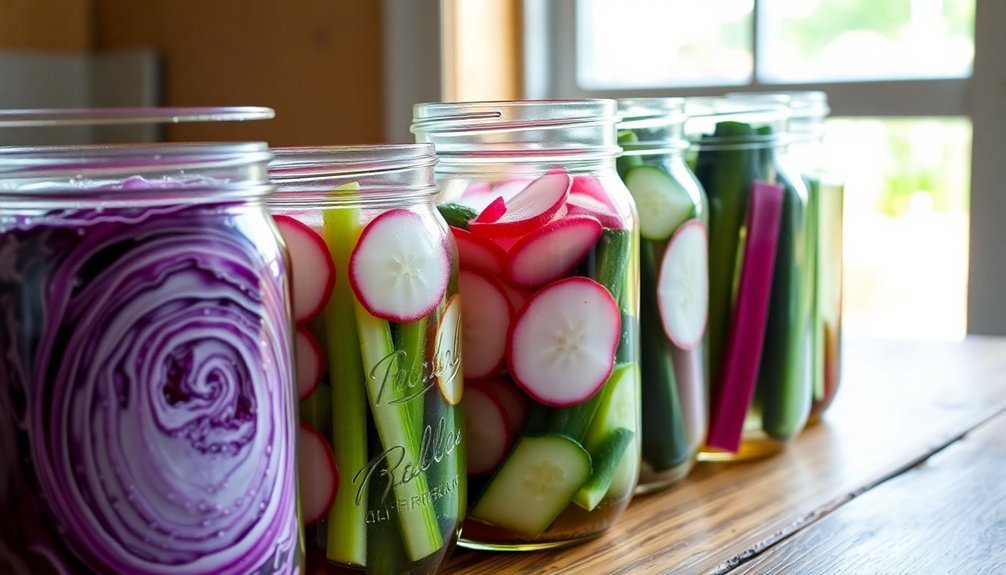
Your gut's bacterial ecosystem expands dramatically when you consume raw fermented foods, as they introduce diverse microbial communities that interact with your existing microbiome.
These beneficial bacteria help break down nutrients, produce essential compounds, and crowd out harmful pathogens that could disrupt your digestive balance.
Research shows that larger fermented food servings lead to even greater improvements in gut microbiome diversity.
Diverse Bacterial Communities Flourish
Introducing beneficial bacteria to your gut, raw fermented foods substantially boost microbiome diversity and enhance immune system function. You'll notice improvements in both short and long-term gut health when you regularly consume these foods, as they create an environment where diverse bacterial communities can thrive and multiply. The production of short-chain fatty acids during fermentation provides essential energy to your colon cells while helping regulate immune responses.
Your gut's microbiome directly impacts your overall health, and fermented foods help establish a robust ecosystem that's more effective than high-fiber diets alone.
When you consume fermented foods regularly, you'll support:
- Reduced inflammation markers, including lower levels of interleukin 6
- Enhanced mineral absorption of iron, zinc, and calcium
- Strengthened intestinal barrier integrity
- Improved immune system response to beneficial microbes
You'll get the most benefit when you combine fermented foods with prebiotics, as this combination helps beneficial bacteria persist in your gut longer. These foods also produce natural antimicrobial compounds that protect you from harmful pathogens while maintaining the balance of beneficial bacteria.
This balanced ecosystem helps prevent various chronic conditions, including obesity, diabetes, and neurodegenerative diseases, making fermented foods an essential component of a health-promoting diet.
Digestive Balance Through Ferments
Regular consumption of fermented foods establishes and maintains ideal digestive balance by enhancing your gut's microbiome diversity. When you eat fermented foods, you're introducing beneficial bacteria that help predigest food components, create essential enzymes, and break down complex molecules into more manageable forms.
These processes make nutrients more bioavailable while neutralizing potentially harmful substances. The fermentation process creates lactic acid that helps prevent the growth of harmful bacteria like E. coli and salmonella.
You'll notice improved digestion as fermented foods help reduce symptoms of gastrointestinal issues, including irritable bowel syndrome. The combination of fermented foods with prebiotics strengthens the persistence of beneficial bacteria in your digestive system, though you'll need to consume them regularly to maintain these populations.
The impact extends beyond basic digestion – you're supporting your immune system, reducing inflammation, and potentially improving your mental well-being through the gut-brain connection.
Clinical trials have shown that diets rich in fermented foods substantially increase microbiome diversity while decreasing inflammatory markers. You'll also benefit from enhanced vitamin production, particularly B and K vitamins, and improved nutrient absorption as fermentation removes anti-nutrients that can interfere with digestion.
The transformation of food compounds into bioactive metabolites through fermentation provides additional health benefits you won't find in non-fermented foods.
Brain-Gut Connection Through Fermentation
The intricate dance between fermented foods and brain health occurs through a fascinating communication network known as the gut-brain axis. Your gut microbes actively convert dietary components into powerful compounds that influence your brain function, mood, and cognitive performance.
When you consume fermented foods, you're supporting a complex system that helps regulate neurotransmitters and maintain mental clarity. The microorganisms in these foods work to strengthen your intestinal barrier, preventing harmful substances from reaching your brain while enhancing the absorption of beneficial nutrients.
Here's how fermented foods specifically support your brain health:
- They increase the diversity of gut bacteria, leading to improved neurotransmitter production
- They help prevent cognitive decline by maintaining a healthy intestinal barrier
- They reduce inflammation throughout your body, including your brain
- They provide bioactive compounds that support overall neurological function
Your gut microbiota's stability directly impacts your mental well-being, and fermented foods provide an effective way to maintain this balance.
Essential Nutrients From Raw Vegetables
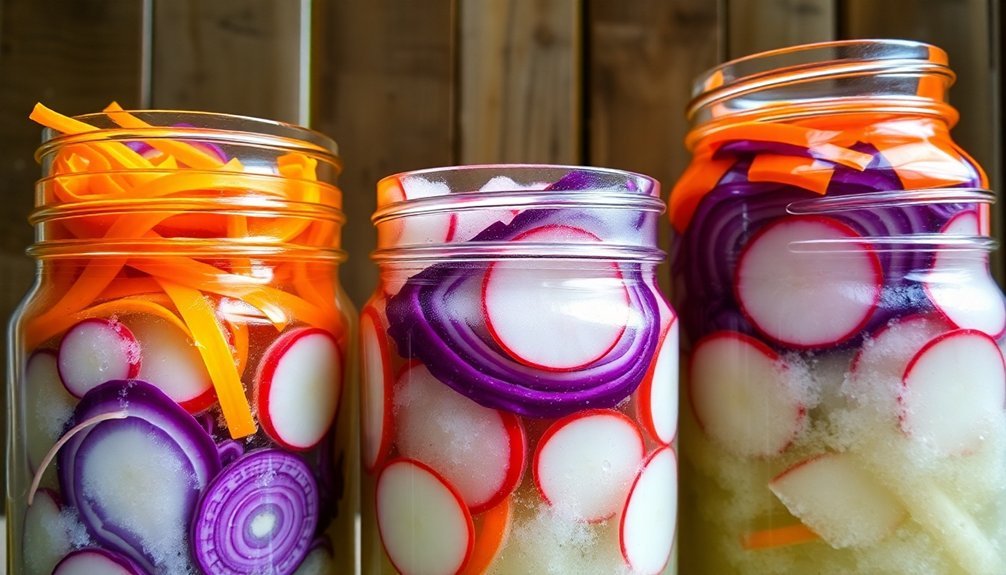
Raw vegetables pack a powerful nutritional punch that's crucial for your overall health and well-being. You'll find abundant calcium in broccoli and leafy greens, while carrots and potatoes deliver significant potassium. Iron-rich options include beans, peas, and spinach, supporting your body's essential functions.
When you eat raw vegetables, you're getting maximum benefits from water-soluble vitamins and antioxidants. Carrots and broccoli provide beta-carotene that protects against oxidative stress, while the high fiber content in peas and starchy vegetables helps regulate your blood sugar and aids digestion.
You'll get different benefits depending on how you consume your vegetables. While raw forms preserve folate and water-soluble vitamins, fermentation can enhance nutrient bioavailability and make them easier to digest.
Through fermentation, you'll also gain additional B vitamins, vitamin C, and vitamin K, along with beneficial probiotics.
To maximize your nutrient intake, you'll want to include both raw and fermented vegetables in your diet. Some vegetables, like onions, offer more benefits raw, while others become more nutritious through cooking or fermentation.
This varied approach guarantees you're getting the widest range of essential nutrients.
Homemade Fermentation Safety Guidelines
Safety protocols form the foundation of successful homemade fermentation. You'll need to follow strict guidelines to guarantee your fermented vegetables are both safe and nutritious. Start with tested recipes and high-quality ingredients, using only non-iodized salt and clean, food-grade equipment.
The key steps for safe fermentation include:
- Begin fermentation within 24 hours of harvesting
- Maintain temperatures between 70-75°F
- Keep vegetables fully submerged under brine
- Store in proper food-grade containers
During the fermentation process, you'll need to monitor conditions carefully. Keep your fermenting vegetables in sealed containers and check regularly for any signs of spoilage. If you notice mold or scum forming on top, remove it promptly with a clean, non-metal spoon.
Once fermentation is complete, you'll want to refrigerate your products immediately. Don't cross-contaminate by using the same utensils for raw meat or fish, and always handle your fermented foods with clean hands.
Modern Applications of Raw Fermentation
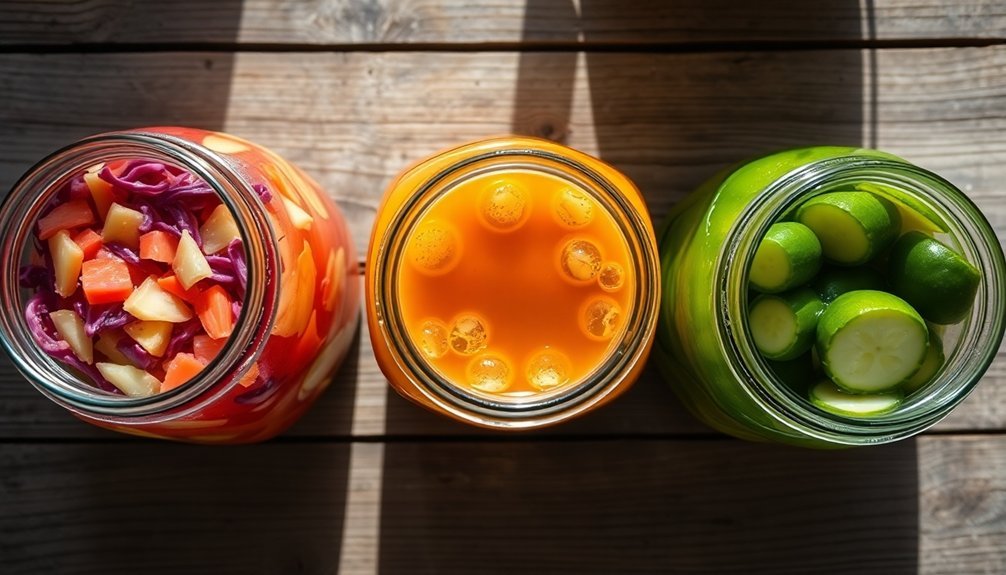
Modern fermentation techniques have revolutionized numerous industries beyond traditional food preservation. Fermentation processes are enhancing the nutritional content of foods by increasing vitamin levels, essential amino acids, and antioxidants while improving nutrient bioavailability.
In food manufacturing, you can now enjoy innovative products created through precision fermentation, including plant-based dairy alternatives and specialized enzymes. Companies are using fermentation to produce proteins identical to animal-derived ones, making sustainable food choices more accessible and appealing.
You'll benefit from fermentation's applications in pharmaceutical production, where it's essential for creating life-saving medications like insulin and vaccines.
The process is also transforming the energy sector, as you can see in the production of biofuels from plant materials and the conversion of organic waste into biogas.
The environmental impact of fermentation can't be overlooked. You're likely already experiencing its benefits in waste management, where anaerobic digestion helps process food scraps and agricultural waste. This application not only reduces greenhouse gas emissions but also creates valuable byproducts like compost and renewable energy, contributing to more sustainable waste management practices.
Frequently Asked Questions
Can Fermented Foods Interact Negatively With Certain Medications?
Yes, you'll need to be cautious as fermented foods can interact with medications like MAOIs, antibiotics, statins, and blood thinners. They might affect drug absorption or cause dangerous side effects.
How Long Can Properly Fermented Foods Be Stored at Room Temperature?
You can store properly fermented foods at room temperature for several months to a year, but you'll need to verify they're below pH 4.6, fully submerged in brine, and kept in a cool, dark place.
Are There Specific Vegetables That Should Not Be Fermented Raw?
You shouldn't ferment leafy greens like kale due to their high chlorophyll content. Also avoid very dry vegetables unless you'll add enough brine. Most other firm, crisp vegetables are suitable for raw fermentation.
Can Children and Pregnant Women Safely Consume Raw Fermented Foods?
You'll need to introduce fermented foods carefully to children and pregnant women. While generally safe, make certain they're properly prepared and sourced. Start with small amounts and consult healthcare providers for specific guidelines.
Does Adding Salt to Fermentation Affect the Probiotic Benefits?
Yes, salt affects probiotics but in a positive way. It creates the perfect environment for beneficial bacteria to thrive while blocking harmful ones. You'll still get probiotic benefits when using the right salt concentration.
In Summary
You'll find raw fermentation offers far more than just food preservation. Through this ancient practice, you're not only creating delicious probiotic-rich foods but also supporting your gut health and mental wellbeing. By following proper safety guidelines, you can confidently ferment at home and tap into the enhanced nutrients of raw vegetables. Whether you're a beginner or experienced fermenter, you're connecting to both traditional wisdom and modern nutritional science.

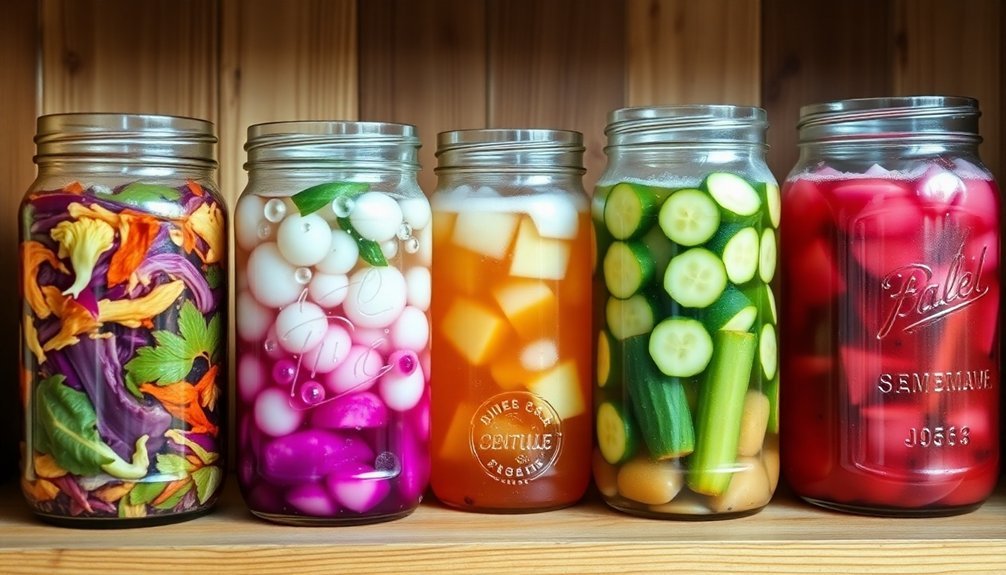


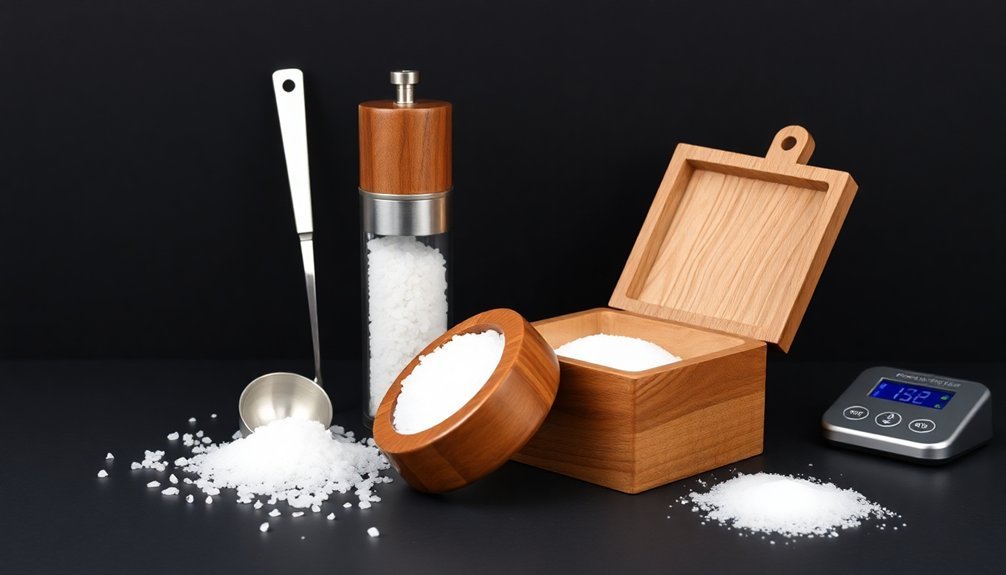
Leave a Reply